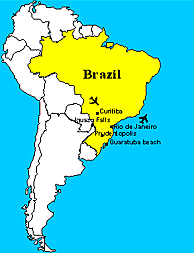Landslide Lula victory

Judy Rebick
Lula said it best: "Hope won over fear." In a decisive victory with a record 86 million votes cast, Luiz Inacio Lula da Silva of the Workers' Party (PT) - known everywhere as Lula - became the President-elect of Brazil last night with 61 per cent of the total (53 million votes).
In what could be an excellent omen, October 27 is also Lula's 57th birthday.
Brazilians poured into the streets to party even before Lula's opponent, Jose Serra, ceded defeat. In Rio de Janeiro, thousands began a march from the top of the famed Corcovado mountain and snaked down through favelos and neighbourhoods to the centre of town, where the partying went on long into the night.
"Lula said he was being elected president of the republic in the name of our generation, everyone who fought for democracy in Brazil and dreamed about this moment," said Workers' Party President Jose Dirceu.
The election of a democratic socialist as president of Brazil, the world's fifth largest democracy, will also have tremendous repercussions across Latin America and around the world. Lula strongly opposes the Free Trade Area of the Americas (FTAA). The PT, along with organized social movements, held a people's plebiscite last month where 10 million people voted 85 per cent against the FTAA. There is no question that Brazil will not only oppose but organize opposition to a free trade deal in the Americas.
President Hugo Chavez of Venezuela spoke of Lula joining him in a Latin American "axis of good," reported the New York Times.
The Workers' Party has pioneered a new form of people's democracy that provides a model for left-wing governments around the world. When he was speaking in Toronto a few years ago, Lula asked, "Did we win democracy, only to have the right to cry out our hunger?" "I want my victory to symbolize that nobody is inferior to anybody else," Mr. da Silva said in a speech on Wednesday. "A lathe operator can be more competent in doing politics than many political scientists."
The World Social Forum organized in PT-led Porto Alegre has already provided a centre for social justice movements around the world. Lula's victory will be a huge injection of energy in building a global movement for social justice.
Alessandra Ceregatti, a young activist in San Paulo, is cautiously optimistic about the win: "I know that voting in Lula alone doesn't do much for change, but someone that comes from one of the poorest regions of Brazil, worked as a steel worker, and is a truly political leader was elected by more than 50 million people [more than the total population of Canada]. That alone is a great achievement, isn't it?"
Perhaps, then, it's the symbolism of Lula's victory that's most important. As the first working class president, Lula's election gives tremendous power to the poor, landless and marginalized people of Brazil. The PT has close links to massive social movements who have promised to mobilize to ensure that this electoral victory is just the beginning of a broad transformation towards social justice.
Ceregatti recognizes the work ahead. "To get the power is not enough," she says. "Now, we have to take it. We have to keep up the mobilization."
Lula, too, faces challenges. Dealing with the massive economic inequalities in Brazil will be an enormous challenge for Lula. Neo-liberalism has hit Brazil's economy hard. The gap between rich and poor is one of the biggest in the world. Unemployment is at its highest levels since early 2000, and there is a $260-billion debt. There is also the difficulty of transforming an economy under the triple threat of investment flight, International Monetary Fund (IMF) sanctions and possible US intervention.
Moreover, Lula's Workers' Party is far from controlling Congress. Brazil's system is modeled on the American system so the President's power can be limited by Congress. In state elections, the PT did not do as well, winning only three governorships across twenty-seven states.
The US government and the markets seem to be taking a wait-and-see approach. US President Bush made a pro forma statement congratulating Lula on his victory through a spokesperson yesterday. Brazilian currency, under attack by international markets since Lula's first round victory October 6, made a slight rally in the last few days.
In his first formal address on television last night, Lula said he would "do everything within my reach to bring peace to our continent" and "build a country that has more justice, brotherhood and solidarity."
Viva o Presidente Lula!
Judy Rebick is one of Canada's best known political commentators and the publisher of rabble.ca, a new online interactive magazine where this article was first published on 28 October 2002. The president of Canada's National Action Committee on the Status of Women from 1990 to 1993, Judy is the author of Imagine Democracy (Toronto: Stoddart, 2000) and Politically Speaking (Kike Roach, co-author) (Toronto: Douglas and McIntyre, 1996), and is currently working on an anecdotal history of feminism in Canada.
Suggested citation
Judy Rebick, 'The axis of good', Evatt Journal, Vol. 2, No. 7, November 2002.<https://evatt.org.au/post/axis-good>
